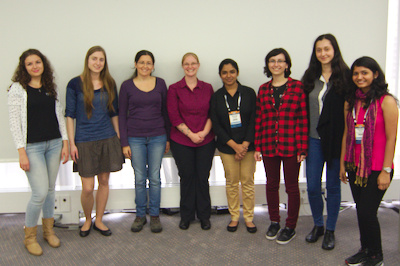It’s been a busy winter for the FOSS Outreach Program for Women (OPW). On October 13, 2014, seven (yes, seven!) of the former Linux kernel OPW interns presented their projects at LinuxCon Europe. From left to right, the OPW alumni are: Valentina Manea, Kristina Martšenko, Ana Rey, Sarah Sharp (coordinator), Himangi Saraogi, Teodora Băluţă, Andreea-Cristina Bernat, and Rashika Kheria.

The OPW presentation room was packed, and I had a couple Linux kernel developers come up to me afterwards and say, “I didn’t realize how complex some of the projects were!” The OPW Linux kernel interns presented their work on Staging IIO drivers, Coccinelle, RCU, removing tree-wide warnings to allow more gcc warnings flags to be turned on, USB over IP, displaying kernel oopses in QR codes, and netfilter tables. Slides are available here.
I’d like to thank the Linux Foundation for covering additional travel costs for several of the interns. I would also like to thank the internship sponsors, Intel, Linux Foundation, Linaro, and Codethink. Finally, this year’s internships could not have been possible without the time volunteered by our Linux kernel mentors: Adrian Chadd, Bob Copeland, Andy Grover, Nick Kossifidis, Greg Kroah-Hartman, Paul McKinney, Pablo Neira, Julia LaWall, Rik van Riel, Luis R. Rodriguez, Josh Triplett, and Peter Waskiewicz Jr.
The OPW application period for the December 2014 to March 2015 internships closed on Friday, Oct 31. The Linux kernel continues to be the most popular project in OPW:
- 24 people applied for an internship and got at least one patch into the Staging tree
- 551 staging cleanup patches were accepted during the one-month application process
- 382 files changed, 3464 insertions(+), 4243 deletions(-)
I’m pleased to announce that the following people have been selected for OPW Linux kernel internships from December 2014 to March 2015:
- Iulia Manda will work with Josh Triplett on kernel tinification.
- Tina Ruchandan will work with Arnd Bergmann on fixing the kernel subsystems that still have issues with 32-bit timer wrap in 2038.
- Tapasweni Patha will work with Julia Lawall and Nicolas Palix on using Coccinelle to track the increase of common bug patterns since a whitepaper was published in 2011.
- Roberta Dobresc will work with Octavian Purdila and Daniel Baluta on migrating Staging IIO drivers to use the kernel’s I/O APIs.
- Ebru Akagundu will work with Rik van Riel on improving transparent huge page swap performance.
I would like to thank the sponsors for this round: Intel, Codethink, and Samsung. Without their funding, it would not be possible to pay the OPW interns for their hard work.
The OPW Linux kernel internships have been a great success. So it is with mixed, bittersweet feelings that I announce I will be stepping down as the coordinator for the Linux kernel OPW internships. The program is running smoothly, and I find joy every day in watching the OPW Linux kernel interns learn and grow. However, I am no longer a part of the Linux kernel community. Julia Lawall, the maintainer of Coccinelle, will be stepping into the role of OPW kernel coordinator.
Fortunately, I’m not leaving the OPW program altogether. I’ve agreed to step up to help Marina Zhurakhinskaya and Karen Sandler coordinate the larger OPW program, and I will be there to help Julia when she takes over as kernel coordinator in February 2015.
I am proud to have jump-started the effort to make the Linux kernel community more diverse by providing a pipeline for women to get involved in Linux kernel development. With the help of mentors and sponsors, we’re slowly increasing the diversity of the Linux kernel community. Four of the eleven OPW interns from the first year the kernel participated in OPW have gotten jobs as Linux kernel developers.
We’re not only improving the community for women developers. We’re helping all newcomers by creating detailed tutorials on how to make your first Linux kernel patch and sharing tips for how to break into open source development culture. OPW is encouraging Linux kernel developers to think about mentorship and sharing their todo lists, which can only help newcomers find larger kernel projects to tackle. Diversity efforts improve communities for everyone.
One thought on “OPW Successes and Succession Planning”
Comments are closed.